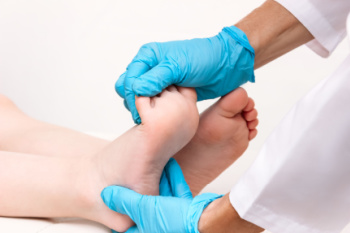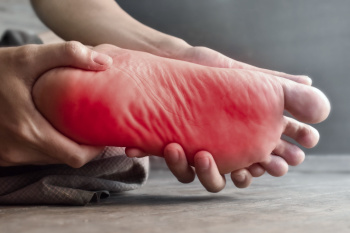Items filtered by date: January 2024
Taking Care of Children’s Foot Health

Tending to children's foot health from birth to the early stages of walking and throughout their growth is important. At birth, baby feet are soft and flexible, with bones that are still forming. Proper foot care involves keeping them clean and dry, and avoiding tight footwear that can restrict movement. As children start to walk, generally between eight and 18 months, their feet undergo significant development. They may initially have a wide gait, but this typically corrects itself over time. It is helpful for parents to encourage barefoot play on safe surfaces to strengthen muscles and improve balance. As children grow, it is beneficial to monitor their foot development and ensure they wear supportive, properly fitting shoes to accommodate their changing foot size and shape. Regular foot checks by a podiatrist are suggested, as this healthcare professional can help detect any potential issues early, and promote healthy foot development for lifelong mobility and comfort.
Making sure that your children maintain good foot health is very important as they grow. If you have any questions, contact Thomas Vail, DPM of Step Alive Foot & Ankle Center. Our doctor can provide the care you need to keep you pain-free and on your feet.
Keeping Children's Feet Healthy
Having healthy feet during childhood can help prevent medical problems later in life, namely in the back and legs. As children grow, their feet require different types of care. Here are some things to consider...
Although babies do not walk yet, it is still very important to take care of their feet.
Avoid putting tight shoes or socks on his or her feet.
Allow the baby to stretch and kick his or her feet to feel comfortable.
As a toddler, kids are now on the move and begin to develop differently. At this age, toddlers are getting a feel for walking, so don’t be alarmed if your toddler is unsteady or ‘walks funny’.
As your child gets older, it is important to teach them how to take care of their feet.
Show them proper hygiene to prevent infections such as fungus.
Be watchful for any pain or injury.
Have all injuries checked by a doctor as soon as possible.
Comfortable, protective shoes should always be worn, especially at play.
If you have any questions please feel free to contact our office located in Findlay, OH . We offer the newest diagnostic and treatment technologies for all your foot and ankle needs.
Choosing the Ideal Shoes for Restaurant Employees

Selecting appropriate footwear is essential for restaurant employees who spend long hours on their feet, navigating through bustling environments. The best shoes for restaurant workers offer comfort, durability, and slip-resistant features to ensure safety and support throughout demanding shifts. Non-slip shoes with rubber outsoles provide traction on wet and slippery surfaces commonly found in kitchens and dining areas, reducing the risk of slips and falls. Additionally, shoes with cushioned insoles and arch support help alleviate foot fatigue and minimize discomfort during extended periods of standing and walking. Opting for breathable materials like leather or mesh promotes airflow, keeping feet cool and dry in hot and humid environments. It is helpful to choose shoes with closed toes and sturdy construction to protect against spills, dropped objects, and other workplace hazards. If you work in the restaurant environment and are seeking additional information about specific shoes to buy for your working day, it is suggested that you consult a podiatrist.
While working on the feet, it is important to take the proper care of them. For more information about working on your feet, contact Thomas Vail, DPM from Step Alive Foot & Ankle Center. Our doctor will treat your foot and ankle needs.
Working on Your Feet
Standing on your feet for long periods of time can cause stress and pain in your feet. Your whole body may experience change in terms of posture, back pain, bunions, callouses and or plantar warts. There are ways to avoid these conditions with proper foot care, smart choices and correct posture.
Positive Changes
Negative heeled shoe – Choosing this shoe type places the heel slightly lower than the ball of the foot. These are great for overall foot health. Find shoes that fit you correctly.
Go barefoot – Our feet were not designed to be enclosed for all hours of the day. Try to periodically expose your feet to air.
Eliminate Pain
Foot Exercises – Performing simple exercises, incorporating yoga and doing stretches are beneficial. This will allow increased blood flow to the area and muscles of the foot.
Achilles tendon – Stretching the foot out flat on the floor will relax the calf muscles and tendon. These exercises can be performed almost anywhere. Make sure you add these exercises to your daily regimen.
With a little bit of this information and knowing more about foot health, you will notice changes. Foot stretches and proper footwear will help with pain and prevent further issues.
If you have any questions please feel free to contact our office located in Findlay, OH . We offer the newest diagnostic and treatment technologies for all your foot and ankle needs.
Symptoms and Risk Factors of Gout

Gout is caused by the accumulation of uric acid crystals in joints, often affecting the big toe. Gout is notorious for its intense pain, which frequently flares up at night. Although commonly associated with men over 45, gout can develop in anyone at any age. This arthritic condition stems from the body's inability to adequately process purines, which are natural substances found in the body. This inability results in the formation of uric acid. When uric acid levels become elevated, sharp urate crystals form and deposit in joints, leading to inflammation, swelling, and excruciating pain. While the big toe is a frequent target, gout can affect any joint and often strikes suddenly, even disrupting sleep with its severity. Dietary factors play a significant role in gout development, with diets high in red meat, seafood, and fructose-containing beverages increasing the risk. Alcohol consumption and obesity also increase susceptibility to gout. Symptoms can include agonizing pain, swelling, warmth, and redness at the affected joint, which may last up to a week before subsiding. Gout is not curable, but it can be managed with the help of lifestyle and dietary changes and treatment from a podiatrist. If you suffer from the symptoms of gout, it is suggested that you are under the care of a podiatrist who is medically trained to manage this ailment.
Gout is a painful condition that can be treated. If you are seeking treatment, contact Thomas Vail, DPM from Step Alive Foot & Ankle Center. Our doctor will treat your foot and ankle needs.
What Is Gout?
Gout is a form of arthritis that is characterized by sudden, severe attacks of pain, redness, and tenderness in the joints. The condition usually affects the joint at the base of the big toe. A gout attack can occur at any random time, such as the middle of the night while you are asleep.
Symptoms
- Intense Joint Pain - Usually around the large joint of your big toe, and it most severe within the first four to twelve hours
- Lingering Discomfort - Joint discomfort may last from a few days to a few weeks
- Inflammation and Redness -Affected joints may become swollen, tender, warm and red
- Limited Range of Motion - May experience a decrease in joint mobility
Risk Factors
- Genetics - If family members have gout, you’re more likely to have it
- Medications - Diuretic medications can raise uric acid levels
- Gender/Age - Gout is more common in men until the age of 60. It is believed that estrogen protects women until that point
- Diet - Eating red meat and shellfish increases your risk
- Alcohol - Having more than two alcoholic drinks per day increases your risk
- Obesity - Obese people are at a higher risk for gout
Prior to visiting your podiatrist to receive treatment for gout, there are a few things you should do beforehand. If you have gout you should write down your symptoms--including when they started and how often you experience them, important medical information you may have, and any questions you may have. Writing down these three things will help your podiatrist in assessing your specific situation so that he or she may provide the best route of treatment for you.
If you have any questions, please feel free to contact our office located in Findlay, OH . We offer the newest diagnostic and treatment technologies for all your foot care needs.
Common Symptoms of Neuropathy in the Feet

Neuropathy, a condition characterized by damage to the nerves, frequently manifests with distinct symptoms in the feet. Sensory disturbances are common, with individuals experiencing tingling or a sensation akin to pins and needles. Numbness is another hallmark symptom, contributing to a reduced ability to perceive temperature and touch. Many individuals with neuropathy report a burning or stabbing pain in their feet that often disrupts daily activities. Muscle weakness may accompany these sensations, leading to difficulties in maintaining balance and coordination. The symptoms of neuropathy can be progressive, and as the condition advances, individuals may face challenges with mobility and foot function. Early recognition of these common symptoms is important for timely diagnosis and intervention. If you have neuropathy that is affecting your feet, it is strongly suggested that you are under the care of a podiatrist who can guide you toward relief and management techniques.
Neuropathy
Neuropathy can be a potentially serious condition, especially if it is left undiagnosed. If you have any concerns that you may be experiencing nerve loss in your feet, consult with Thomas Vail, DPM from Step Alive Foot & Ankle Center. Our doctor will assess your condition and provide you with quality foot and ankle treatment for neuropathy.
What Is Neuropathy?
Neuropathy is a condition that leads to damage to the nerves in the body. Peripheral neuropathy, or neuropathy that affects your peripheral nervous system, usually occurs in the feet. Neuropathy can be triggered by a number of different causes. Such causes include diabetes, infections, cancers, disorders, and toxic substances.
Symptoms of Neuropathy Include:
- Numbness
- Sensation loss
- Prickling and tingling sensations
- Throbbing, freezing, burning pains
- Muscle weakness
Those with diabetes are at serious risk due to being unable to feel an ulcer on their feet. Diabetics usually also suffer from poor blood circulation. This can lead to the wound not healing, infections occurring, and the limb may have to be amputated.
Treatment
To treat neuropathy in the foot, podiatrists will first diagnose the cause of the neuropathy. Figuring out the underlying cause of the neuropathy will allow the podiatrist to prescribe the best treatment, whether it be caused by diabetes, toxic substance exposure, infection, etc. If the nerve has not died, then it’s possible that sensation may be able to return to the foot.
Pain medication may be issued for pain. Electrical nerve stimulation can be used to stimulate nerves. If the neuropathy is caused from pressure on the nerves, then surgery may be necessary.
If you have any questions, please feel free to contact our office located in Findlay, OH . We offer the newest diagnostic and treatment technologies for all your foot care needs.
